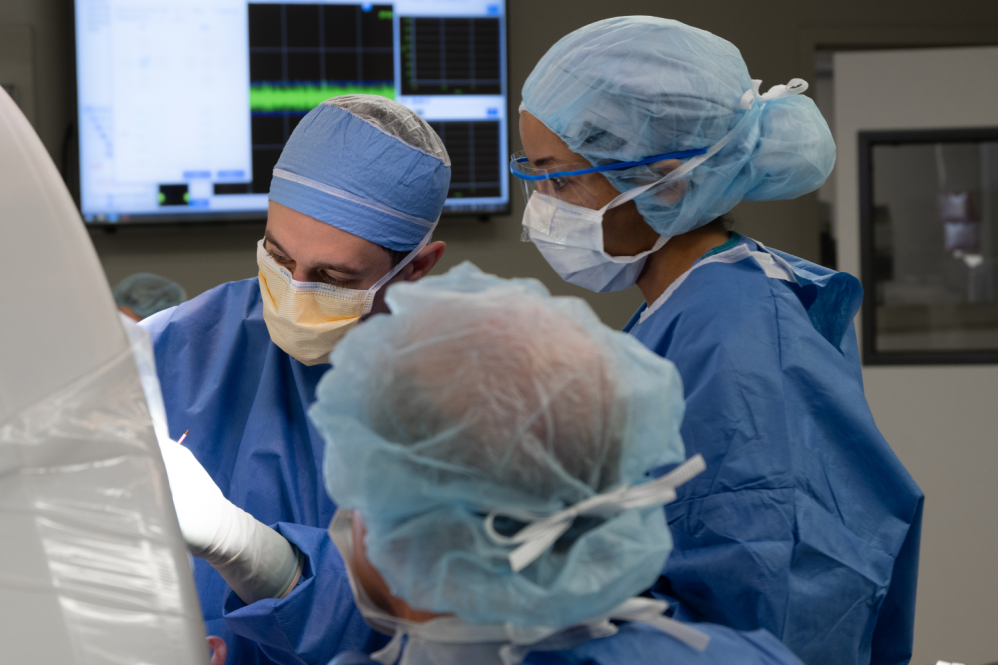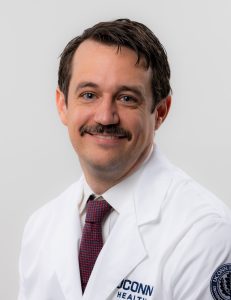I think most stroke survivors would rather do the non-invasive approaches. So ask your doctor why surgery; I'm guessing revenue and profits.
Dorset Embarks on Revolutionary Stroke Recovery Trial Utilizing Earpiece Technology
Non-invasive VNS approach could enhance post-stroke recovery outcomes August 2023
The latest here:
First in Connecticut: Ischemic Stroke Survivors Have Renewed Hope with the Vagus Nerve Stimulation Device Now Available at UConn Health
Dr. Christopher Connor, neurosurgeon at UConn Health’s Brain and Spine Institute was the first to use the MicroTransponder®, Inc.’s Vivistim® Paired VNS™ System, an FDA-approved, breakthrough technology for stroke survivors experiencing ongoing hand and arm impairment

Dr. Christopher Conner, Neurosurgeon at UConn Health Brain and Spine Institute performing surgery.
Stroke affects nearly 14 million people worldwide per year and can frequently produce loss of mobility. Patients can regain some function with intensive rehabilitation therapy for the first few months after stroke, but this recovery often plateaus and patients are left with a “new normal.”

UConn Health has become the first and only health system in Connecticut to implant a device intended to improve upper body mobility in patients who have experienced a debilitating stroke. Dr. Christopher Conner, neurosurgeon at UConn Health’s Brain and Spine Institute, was the first to use the MicroTransponder®, Inc.’s Vivistim® Paired VNS™ System, an FDA-approved, breakthrough technology for stroke survivors experiencing ongoing hand and arm impairment.
The small device is implanted in a patient’s upper chest, delivering vagus nerve stimulation (VNS) during rehabilitation therapy. The pairing of rehabilitation exercise with VNS creates or strengthens nerve connections in healthy areas of the brain, which increases the effectiveness of the therapy and has been shown to improve upper limb function.
In clinical trials, the Vivistim Paired VNS System, coupled with intensive rehabilitation therapy, has resulted in improved hand and arm function for stroke survivors.
“This is a revolutionary treatment option for patients who previously have had little to no hope for improvement. It is also a testament to the commitment of our world class neurosurgery program in the Brain and Spine Institute that we will provide care second to none and continue to shape the future of treatment,” says Dr. Ketan Bulsara, Chief of the Division of Neurosurgery at UConn Health Brain and Spine Institute.
“We are excited to partner with our rehab teams to offer paired VNS therapy. Stroke survivors can use this new treatment to help them return to their normal routine. The surgery is outpatient, meaning that patients can immediately start working on improving motor function. There has been tremendous success already, and we’re happy to offer it here in Connecticut,” says Conner.
The first patient to be treated with the device at UConn Health was a man in his 60s who experienced a stroke five years ago, had the device implanted on May 9th and will begin rehabilitation therapy using the device.
During rehabilitation therapy, a therapist uses a wireless remote to activate the Vivistim device to deliver a gentle pulse to the vagus nerve while the stroke survivor performs a specific task, such as putting on a hat, brushing hair or cutting food. Once patients have graduated from the intensive program, they are then able to continue their progress through a self-directed, home-based stroke rehabilitation program using a magnet to activate the Vivistim System daily.
The simultaneous pairing of the rehabilitation exercise with vagus nerve stimulation releases neuromodulators that help create or strengthen neural connections to improve upper limb function and increase the relevance of physical or occupational therapy.
Many Ischemic stroke survivors have long-term loss of mobility and strength making routine tasks feel nearly impossible; and, like most stroke survivors, rehabilitation therapy eventually plateaus.
This innovative new technology now offers patients the chance to improve their recovery even after significant time has passed.
UConn Health, through the world class Brain and Spine Institute, has a long-standing history of being a leader in comprehensive stroke care in Connecticut. A multi-disciplinary team of experts provides fast, efficient care for patients experiencing symptoms of stroke and personalized, ongoing care for patients who have already experienced a stroke or have other risk factors. UConn Health is dedicated to bringing leading edge, potentially life changing treatment approaches to stroke survivors by ensuring patients have access to innovative therapeutic options.
No comments:
Post a Comment